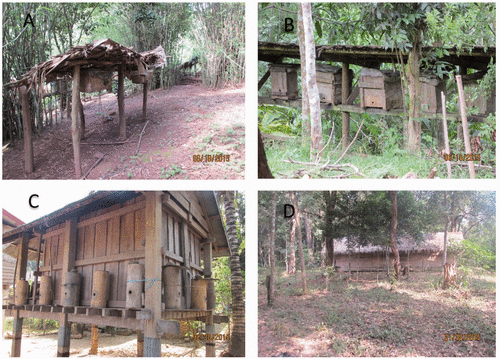The widely forested areas of Lao People’s Democratic Republic (PDR) are favorable for the small-scale beekeeping practices that have developed in the northern provinces. Natural beekeeping (local beekeepers have hung beehives in or nearby forest with A. cerana in the traditional hives) has been practiced in Oudomxay Province, and small apiculture industries have been set up near the forest and in beehive logs close to a rice store. However, to date no quantitative analysis has been undertaken to evaluate the economic significance of beekeeping in Lao PDR.
Together with Prof. CHEN Jin, Souvick Chanthayod, who is from Lao and now pursuing his Master degree at Xishuangbanna Tropical Botanical Garden (XTBG), conducted a study to see the benefits of beekeeping and its contribution to forest conservation.
The researchers used a systematic sampling approach to select 120 households both for the survey and interviews. They designed structured questionnaires to obtain demographic information that included the following: age, gender, educational level (primary school, secondary school, and technical school), family size, number of laborers, occupation, and years of beekeeping experience. The questionnaire also included seven items related to attitudes toward biodiversity conservation (e.g., cutting the forest is a good for keeping bees; I often convince people not to cut the trees in the forest; etc).
They found that local households do indeed generate a more significant income by collecting honey than from other non-timber forest products (NTFPs). Furthermore, beekeepers also tend to have pro-environmental attitudes toward forest conservation. Most beekeepers hold the view that sustainable forest management practices are good for beekeeping, and they are willing to convince other people not to disturb the forests.
The researchers therefore proposed that beekeeping be regarded as a valuable commercial industry that is also protective of the forests; it both alleviates poverty and promotes forest conservation programs in the mountainous areas of Lao PDR.
The study entitled “People’s Perceptions of the Benefits of Natural Beekeeping and Its Positive Outcomes for Forest ConservationA Case Study in Northern Lao PDR” has been published in Tropical Conservation Science.
Contact
CHEN JIN Ph.D Principal Investigator
Key Laboratory of Tropical Forest Ecology, Xishuangbanna Tropical Botanical Garden, Chinese Academy of Sciences, Mengla, Yunnan 666303, China
Tel: 86-691-8715457
E-mail: cj@xtbg.org.cn

Photos showing beekeepers locating beehives nearby/within natural forest;
(a) Hanging beehives in the forest; (b) Small apiculture near the forest;
(c) Set beehive logs surround rice store;
(d) apiculture hut inside forest.
(Images by Souvick Chanthayod)

